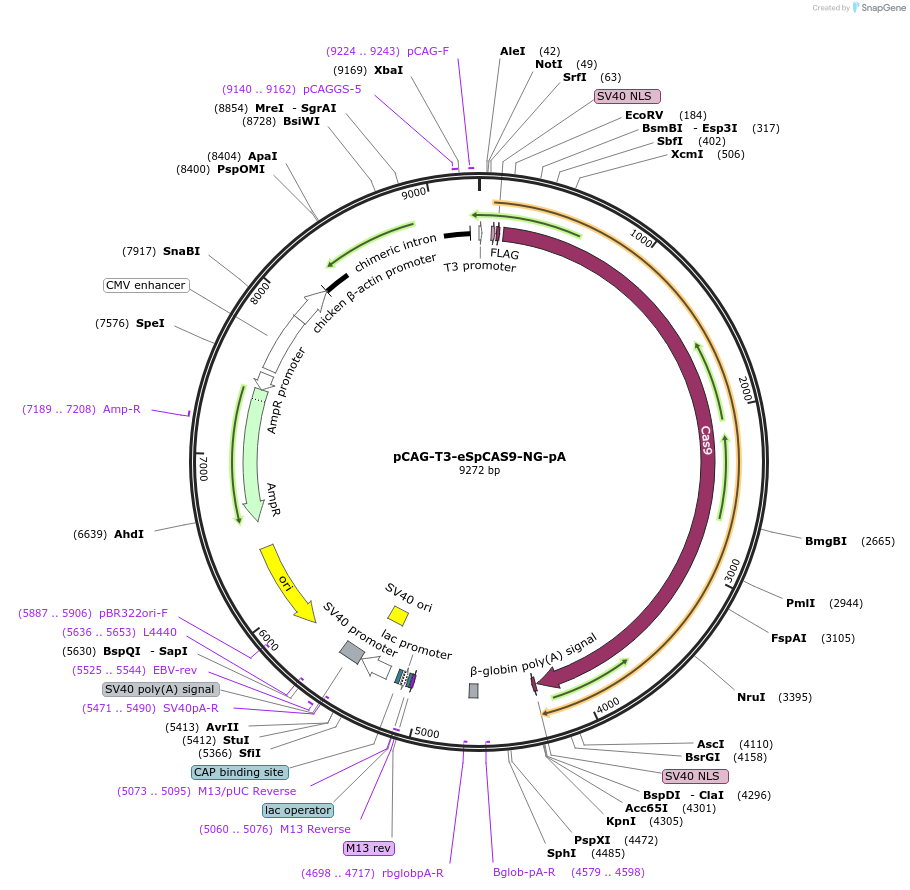pCAG-T3-eSpCAS9-NG-pA
(Plasmid
#131466)
-
PurposeExpresses eSpCAS9-NG nuclease in mammalian cells. Used to modify genome of mouse embroys
-
Depositing Lab
-
Sequence Information
Ordering
| Item | Catalog # | Description | Quantity | Price (USD) | |
|---|---|---|---|---|---|
| Plasmid | 131466 | Standard format: Plasmid sent in bacteria as agar stab | 1 | $89 | |
Backbone
-
Vector backbonepCAGGS
- Total vector size (bp) 9293
-
Vector typeMammalian Expression, CRISPR
Growth in Bacteria
-
Bacterial Resistance(s)Ampicillin, 100 μg/mL
-
Growth Temperature37°C
-
Growth Strain(s)DH5alpha
-
Copy numberUnknown
Gene/Insert
-
Gene/Insert nameCodon optimized eSpCas9-NG
-
SpeciesSynthetic
-
Insert Size (bp)4218
-
Tags
/ Fusion Proteins
- Flag (N terminal on insert)
- NLS (N terminal on insert)
- NLS (C terminal on insert)
- polyA (C terminal on insert)
Terms and Licenses
-
Academic/Nonprofit Terms
-
Industry Terms
- Not Available to Industry
Trademarks:
- Zeocin® is an InvivoGen trademark.
Depositor Comments
This plasmid vector was constructed by mutation PCR of pCAG-T3-hCAS9-pA plasmid vector (Addgene plasmid 48625) according to the amino acid sequences of SpCas9-NG shown in previous study (Nishimasu H et al., Engineered CRISPR-Cas9 nuclease with expanded targeting space. Science, 2018) with high-fidelity eSp variant shown in previous study (Slaymaker IM et al, Rationally engineered Cas9 nucleases with improved specificity. Science, 2016).
These plasmids were created by your colleagues. Please acknowledge the Principal Investigator, cite the article in which the plasmids were described, and include Addgene in the Materials and Methods of your future publications.
-
For your Materials & Methods section:
pCAG-T3-eSpCAS9-NG-pA was a gift from Wataru Fujii (Addgene plasmid # 131466 ; http://n2t.net/addgene:131466 ; RRID:Addgene_131466) -
For your References section:
Generation of genetically modified mice using SpCas9-NG engineered nuclease. Fujii W, Ito H, Kanke T, Ikeda A, Sugiura K, Naito K. Sci Rep. 2019 Sep 9;9(1):12878. doi: 10.1038/s41598-019-49394-5. 10.1038/s41598-019-49394-5 PubMed 31501500



